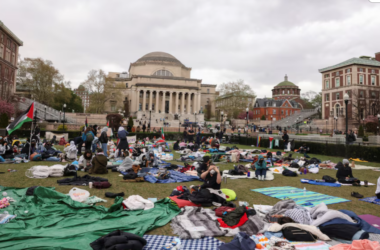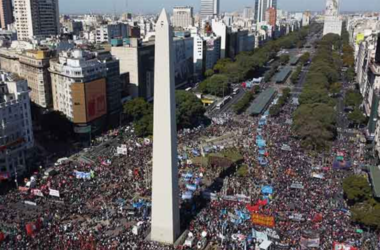On a sweltering afternoon, hundreds of men and women gathered near the Yamuna river in northeast Delhi, in an open area bigger than a football stadium. As the crowd swelled, dust filled the air, and people covered their faces with towels and stoles as they headed toward a makeshift tent, passing through layers of security checks. They were there to see India’s Prime Minister Narendra Modi, who is seeking a third term in the ongoing general elections.
Azaad, who identifies only by his first name, was among the teeming audience cheering for Modi. He cited the popularity of the prime minister and the benefits of his flagship schemes, including free food rations, medical insurance, and easier access to cooking gas. However, Azaad, a sanitation worker belonging to the historically disadvantaged Balmiki caste, also reflected on his unfulfilled aspirations due to unemployment and inflation.
As Modi’s helicopter appeared, Azaad joined others in chanting slogans associated with Modi’s Bharatiya Janata Party (BJP), temporarily setting aside his disappointments.
Delhi, with its seven parliamentary seats, votes on May 25 in the penultimate phase of the Indian elections. The national capital holds significant political weight as the “political power center of India,” according to Tanvir Aeijaz, associate professor of political science at Ramjas College, University of Delhi. For the BJP, these seats have historically been a bellwether of national prospects. Since 1989, the BJP has only failed to win a majority of Delhi’s seats twice, coinciding with its national losses in 2004 and 2009.
On the same Saturday, another group of voters gathered 16 kilometers away in northwest Delhi’s Ashok Vihar to see Rahul Gandhi, the great-grandson of India’s first prime minister and the Congress party’s top leader. Zikr Ullah, an Urdu teacher, criticized Modi and the BJP for contributing to religious polarization and cited unemployment and inflation as reasons for discontent.
The next morning, Arjun Singh Meena, a farmer from Madhya Pradesh, arrived in Delhi to support Arvind Kejriwal, Delhi’s chief minister and leader of the Aam Aadmi Party (AAP). Meena was upset over the crackdown on opposition leaders by central agencies under the Modi government. Kejriwal, recently jailed on corruption charges, was released on temporary bail to campaign.
The AAP has been dominant in Delhi’s state elections, winning more than 60 seats in 2015 and 2020, but has failed to win any national parliament seats from Delhi, with the BJP sweeping all seven in 2014 and 2019. This year, AAP and Congress are allied, with AAP contesting four seats and Congress the remaining three. Shama Mohamed, national spokesperson of Congress, believes this consolidated fight will prevent the division of opposition votes.
Delhi’s 14.72 million voters come from diverse backgrounds, ranging from the city’s elite in upscale localities to residents of unauthorized settlements and slums. The city also has a high population of interstate migrants, which adds to its political complexity.
Sandeep Pathak, a close aide to Kejriwal and a member of parliament, is optimistic that the united opposition will bring change. The AAP’s campaign focuses on its governance model, which includes improving schools, public healthcare, and providing free utilities for the poor.
However, BJP leaders are confident of retaining Delhi’s support. In 2019, the BJP won 57 percent of the city’s votes and has introduced new candidates to counter anti-incumbency. RP Singh, BJP’s national spokesperson, suggested that internal dissent within Congress over the alliance with AAP indicates fissures in the opposition bloc.
As Delhi votes, the outcome will not only reflect the city’s political leanings but also potentially signal broader national trends for the BJP. The results on June 4 will reveal whether Modi’s BJP can maintain its stronghold in Delhi and possibly secure national success.








